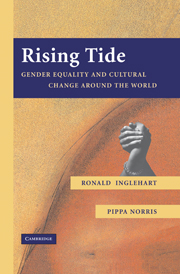Book contents
- Frontmatter
- Contents
- List of Tables
- List of Figures
- Preface and Acknowledgments
- PART I THE CAUSES OF THE RISING TIDE
- 1 Introduction: Explaining the Rising Tide of Gender Equality
- 2 From Traditional Roles toward Gender Equality
- 3 Religion, Secularization, and Gender Equality
- PART II THE CONSEQUENCES OF THE RISING TIDE
- CONCLUSIONS
- Appendix A
- Appendix B
- Appendix C Technical Note on the Major Scales
- Notes
- Select Bibliography
- Index
3 - Religion, Secularization, and Gender Equality
Published online by Cambridge University Press: 22 October 2009
- Frontmatter
- Contents
- List of Tables
- List of Figures
- Preface and Acknowledgments
- PART I THE CAUSES OF THE RISING TIDE
- 1 Introduction: Explaining the Rising Tide of Gender Equality
- 2 From Traditional Roles toward Gender Equality
- 3 Religion, Secularization, and Gender Equality
- PART II THE CONSEQUENCES OF THE RISING TIDE
- CONCLUSIONS
- Appendix A
- Appendix B
- Appendix C Technical Note on the Major Scales
- Notes
- Select Bibliography
- Index
Summary
We have established the existence of systematic and predictable differences in cultural attitudes toward gender equality that vary across nations according to their level of human development, within societies based on generational differences, and among social groups according to factors such as education and marital status. Building on this foundation, this chapter demonstrates that the process of societal modernization in any given society is conditioned by cultural legacies and religious traditions. We hypothesize that (1) a process of secularization has gradually accompanied societal modernization, weakening the strength of religious values in postindustrial societies, particularly among the younger generation, and fuelling the rising tide of gender equality. (2) Postindustrial societies have experienced a parallel liberalization of attitudes toward sexuality, exemplified by the issues of abortion, homosexuality, prostitution, and divorce. (3) Yet religiosity continues to exert a strong influence on social norms about the appropriate division of sex roles in the home, the workforce, and the public sphere, especially in agrarian societies. (4) Moreover, attitudes toward women vary among adherents of different religious sects and denominations; in particular, an Islamic religious heritage is one of the most powerful barriers to the rising tide of gender equality.
The literature suggests multiple reasons why religion can be expected to exert a major influence over prevalent attitudes and practices regarding sex roles.
An extensive body of work in sociology, social psychology, anthropology, and theology studies suggests that religion has functioned as one of the most important agencies of socialization determining social norms and moral values with regard to gender equality in all societies, and influencing support for feminism and attitudes toward the second-wave women's movement. The role of the church in this process is similar to that of other important socialization agencies, including the family, community, school, workplace, and the mass media.
[…]
- Type
- Chapter
- Information
- Rising TideGender Equality and Cultural Change Around the World, pp. 49 - 72Publisher: Cambridge University PressPrint publication year: 2003
- 2
- Cited by



